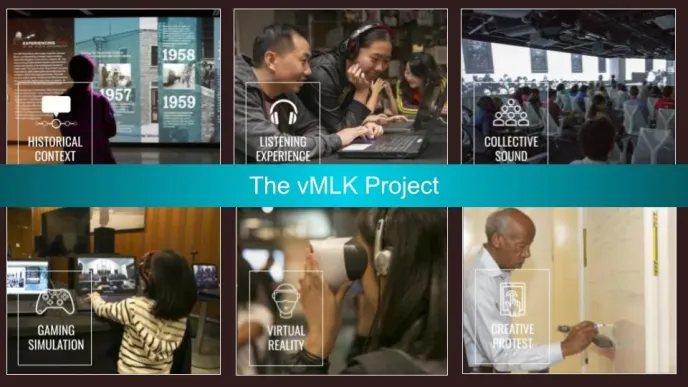The Virtual Martin Luther King Project

On February 16, 1960, shortly after the start of the Greensboro sit-ins, Dr. Martin Luther King, Jr. delivered the speech “A Creative Protest” at the White Rock Baptist Church in Durham, NC. Despite the historical and rhetorical significance of what became more commonly known as the “Fill Up the Jails” speech, no known recording exists. The Virtual Martin Luther King Project (vMLK) began as a partnership between the White Rock Baptist church congregation and scholars and students at NC State University. The result was a public recreation of King’s speech at the current church sanctuary on June 8, 2014. Featuring a voice actor, Mr. Marvin Blanks, the recreation event attracted over 250 people, including individuals who had attended the speech in 1960, area politicians and activists, members of the Durham Ministerial Alliance, congregation members, and members of the NC State community. Based on the sound recordings of the recreation, the vMLK Project utilizes advanced digital and audio technologies to afford scholars, students and citizens an opportunity to engage this speech through the presentation of six components: historical context, individual listening and collective sound experiences, virtual reality and gaming platform experiences, and an interactive feedback and reflection opportunity.
The vMLK project engages individuals and groups in the hermeneutic act of experiencing and interpreting what was, what is, and what has never been in relation to public address and civic transformation. The project thus serves to expand audiences’ understanding of 1) specific aspects of civil rights history in North Carolina and in relation to the history and impact of the larger movement, 2) the nature of civic and political engagement, both in the 1950s/ and 1960s and today, 3) the transformative and affective aspects of public address, particularly in relation to issues of racial justice, and 4) the importance of sound in developing immersive experiences. Our assessment of the project is informed by audience feedback and survey data regarding the extent to which the project achieves the following:
- Documenting and recovering the history and everyday experience of African American/Black life.
- Innovating the use of digital tools to provide audiences with historical and cultural knowledge.
- Providing audiences with sound-centered experiences of civic and political engagement and transformation.
- Providing pedagogical materials for teachers and students in the areas of civil rights history, social studies, public address and visual/digital rhetoric.
The vMLK Project is thus a remarkable partnership between the leaders and members of a church community and the scholars and students of an academic community who joined together to preserve and commemorate a significant moment in history by recreating it and making it accessible to new audiences in new ways. This is truly a public humanities project with significant reach across a variety of communities. Indeed, one of the best aspects of the vMLK/White Rock partnership has been the ongoing engagement with the congregation and the feedback that congregation members have provided to make the project as meaningful and impactful as possible. When asked to evaluate the impact of the vMLK Project, members of the White Rock community requested that it be extended into the larger community, including high schools and beyond, and the vMLK Team has worked to accomplish just that.
Since its first public exhibition in February 2015, over 30,000 people have experienced the vMLK Project through site-based exhibitions and countless more (25,000+) through the project website. Each academic year, approximately 1,000 undergraduate students at NC State University experience the project through their public speaking curriculum, leading up to their advocacy speech assignment. Additionally, the vMLK Project was featured in a 2018 article in the Washington Post examining digital humanities projects, was exhibited at the Smithsonian National Museum of American History in October 2017, and received both a two-year NEH Digital Projects for the Public Production grant and an 18-month ACLS Digital Extension grant. The project was also recognized by the North Carolina Humanities Council with the Harlan Joel Gradin Award for Excellence in Public Humanities. In order to reach a youth audience, in 2020 the vMLK team began working with high school teachers to incorporate the vMLK Project into English/Language Arts and History/Social Studies curricula. The resulting materials are available through the project website and through the NEH EDSITEment website.
The life of this project is ongoing and its impact—in relation to transforming people’s hearts and minds by recovering and reanimating history—continues.
Dr. Victoria Gallagher is a Professor of Communication at North Carolina State University. Her primary area of scholarship is interpretive analysis of civil rights-related discourse, commemorative sites (museums and memorials), visual and material culture, and public art. She is the principal investigator of the award winning Virtual Martin Luther King project, a significant long term digital humanities project for the public, supported in part by major grants from the National Endowment for the Humanities and the American Council of Learned Societies. In addition to her work on public projects such as vMLK and the North Carolina Freedom Park Project, Prof. Gallagher is the editor of a book series titled, Movement Rhetoric/Rhetoric's Movements for the University of South Carolina Press. In 2020, the NC State Board of Trustees awarded Dr. Gallagher the Alexander Quarles Holladay Medal of Excellence, the highest honor the University bestows on a faculty member, in recognition of her significant contributions in the humanities.